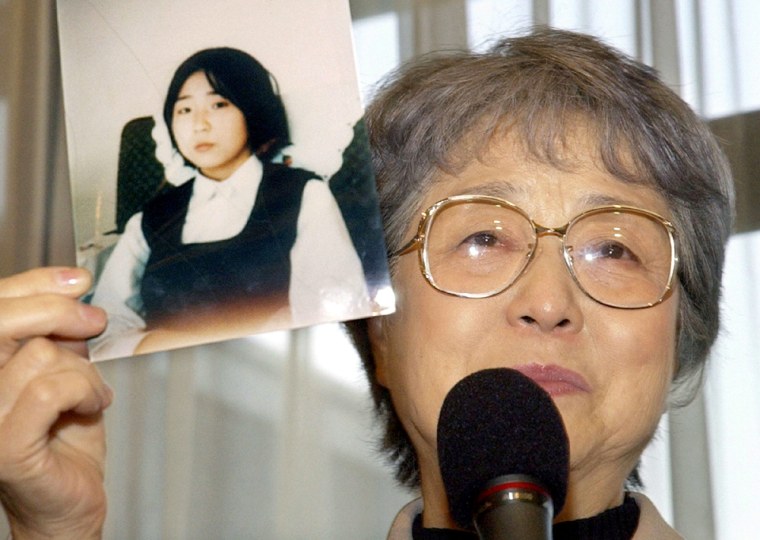For years, Japan saw kidnapping victim Megumi Yokota only as an innocent child, a fresh-faced junior high badminton player in school uniform, black hair framing her cheeks.
Now for the first time, photographs are on display of Yokota’s life after her 1977 abduction by North Korean spies, as she grew from a teenager into an adult imprisoned behind the reclusive regime’s wall of secrecy.
Three images of Yokota provided by North Korea — one as a sad-eyed teenager and two as a young woman — dominated front pages and talk shows this week, intensifying Japanese anguish and outrage over her abduction.
“We couldn’t help crying when we saw the picture showing her worrying face looking directly at the camera,” Megumi’s mother, Sakie Yokota, tearfully told reporters. “I don’t know whom she wanted to appeal to ... after being kidnapped in suffering and tears.”
One of 13 who disappeared
Megumi Yokota is among 13 Japanese citizens North Korea has admitted kidnapping in the 1970s and 80s. Five were allowed to return to Japan in 2002, but North Korea has claimed — so far unconvincingly — that the others, including Yokota, are dead.
Her age at the time of her kidnapping — 13 — and the tireless efforts of her parents have turned Megumi Yokota into a symbol of Japanese indignation over the kidnappings and a poster child for the campaign by abductees’ families to win a full investigation into the fates of the victims.
The families have called for sanctions against North Korea. But Prime Minister Junichiro Koizumi, under questioning in a Parliament hearing, said he wants to keep the North Koreans engaged in hopes of making progress.
“There is still room for negotiations,” he insisted Wednesday. “We should make the effort, even if we can take only one or two steps ahead at a time.”
While the latest negotiations in the North Korean capital, Pyongyang, have not yielded what the Japanese hoped for, they did promise to shed faint light on Yokota’s case.
North produces apparent husband and daughter
The Japanese negotiators who returned from North Korea on Monday met with Kim Chol Jun and Kim Hea Kyong, identified by Pyongyang as Yokota’s husband and daughter. The negotiators also visited a hospital that supposedly treated Yokota and were given lengthy health records.
In a heartbreaking turn, Kim Chol Jun handed over an urn containing what the North says are Yokota’s remains. Pyongyang claims she committed suicide in 1994; DNA identification is expected next week.
But with North Korea’s history of deception — bones it claimed in 2002 belonged to another abductee, for example, turned out to be someone else’s — speculation has gone into overdrive about whether Yokota was being kept in the country ruled by Kim Jong Il.
After years of mystery, the new photos are tantalizing.
In the earlier picture, Yokota looks forlornly into the camera, wearing what experts say is a typical North Korean school uniform. In another, she poses, smiling slightly, well-dressed and apparently well-fed. The third photograph shows her standing next to a black car, with snowdrifts behind her.
“Looking at these calmly, the pictures show her in neat clothing and wearing makeup,” observed her father, Shigeru Yokota. “I feel she possibly lived a relatively happy life.”
Analyzing the strange tale
Talk show panelists examined the photos in excruciating detail Wednesday, bringing out a drama professor who scrutinized Yokota’s expressions for clues to her emotional state and an auto expert who identified the car as a Mercedes.
Media accounts have focused on inconsistencies in North Korean accounts of Yokota’s death: changing dates, alleged contradictions in hospital records and suspicions that, as an attractive young woman, she was associated too closely with North Korea’s elite to be allowed to leave.
“I imagine she had been very close to Kim Jong Il. I hear people say she had been his teacher and so on,” said Kaneko Tomiyama, a 51-year-old Tokyo woman. “I think she was not allowed to return to Japan because she knew too much about the North.”
The man identified as her husband also reportedly refused to provide hair and blood samples that would prove he fathered the girl identified as their daughter.
Her family is still clinging to hope she is alive.
“I know that everything in that country is a lie,” Yokota’s mother said. “I’m praying that the DNA tests on the remains will show they are not Megumi’s.”
